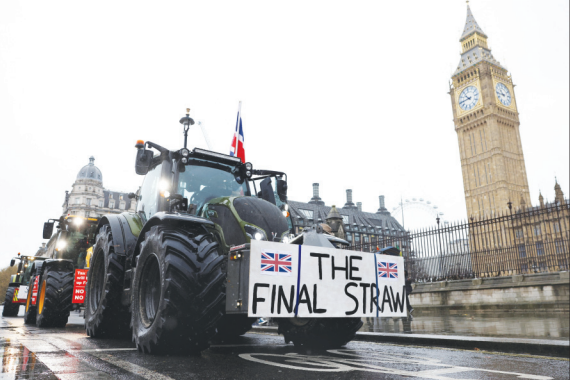“`html
Farmers Ignite Passionate Protest in Central London Against Tax Changes!
The Background of the Protest
In a powerful display of solidarity and urgency, farmers from across the UK have gathered in Central London to protest tax changes that they believe threaten their livelihoods and the future of British agriculture. These farmers, often the backbone of the economy, have voiced their concerns over recent reforms that impose increased taxation on their yields, ultimately threatening food security and the sustainability of the farming industry.
Key Reasons for the Protest
The farmers’ protest is rooted in several critical issues:
- Increased Tax Burdens: Proposed tax changes could drastically increase operational costs for farmers.
- Impact on Smallholdings: Small farms, which are already struggling, may face existential threats under new tax policies.
- Food Security Concerns: Farmers warn that these taxes could limit production capacity, leading to increased reliance on imports.
- Environmental Sustainability: The changes may also hinder farmers’ ability to adopt sustainable practices, key to combating climate change.
Voices from the Field
First-Hand Experiences
Farmers from diverse backgrounds shared their experiences at the protest. Here are a few testimonials:
“We are not just farming; we are feeding this nation. These tax changes could cripple our farms and put us out of business,” said Mark Thompson, a small-scale organic farmer from Kent.
“The government’s focus should be on supporting local agriculture, not taxing us out of existence. We need a fair chance to thrive,” stated Fiona Clarke, a dairy farmer from Wales.
Case Studies: Farmers Facing Challenges
| Farmer Name | Location | Type of Farming | Challenges Faced |
|---|---|---|---|
| Mark Thompson | Kent | Organic | Increased costs, lower yields |
| Fiona Clarke | Wales | Dairy | Higher taxes, stricter regulations |
| James Murphy | Yorkshire | Cereal Crops | Market fluctuations, tax implications |
Expected Outcomes of the Protest
As the protest continues in Central London, farmers hope to achieve several outcomes:
- Government Reconsideration: Farmers are urging policymakers to reassess the proposed tax changes and engage in meaningful dialogue.
- Increased Public Awareness: By drawing attention to their plight, farmers hope to gain
Farmers Rally in London Against New Inheritance Tax Changes
On Tuesday, a large gathering of farmers took to the streets of Westminster, central London, to voice their concerns over proposed changes to inheritance tax regulations by the UK Labour Party government. They argue that these adjustments could result in hefty tax fees, compelling them to sell essential agricultural land and posing risks to the country’s food supply.
Background on Inheritance Tax for Farms
Since 1992, farms in the UK have benefited from an arrangement permitting them to be transferred between family members without incurring inheritance taxes. This policy was designed not only to safeguard family businesses but also to promote sustainable food production across the nation.
Proposed Changes and Financial Impact
The recent budget plan put forward by Chancellor Rachel Reeves suggests that starting April 2026, farms exceeding specific valuations will incur a considerably lower inheritance tax rate of 20% instead of the standard 40%. Notably, any taxes owed can be paid interest-free over a decade—a significant shift from usual procedures that require immediate payments.
Tom Bradshaw, President of the National Farmers’ Union (NFU), expressed his outrage during an interview with Sky News. He recounted an earlier promise made by Steve Reed—who currently serves as secretary for environment and rural affairs—that there would be no alterations to agricultural property relief. ”This industry feels let down,” he stated emphatically.
Bradshaw pointed out that farmers often find themselves ‘asset rich but cash poor’, highlighting their struggle amid rising costs associated with farming while working tirelessly to feed the nation sustainably. “If fair margins were provided for our produce allowing us sufficient income — then sure we’ll contribute more tax,” he remarked. “But right now our returns from supply chains are insufficient.”
Government’s Perspective on Tax Revisions
Before this protest unfolded, Reed acknowledged his change in stance upon entering office and uncovering crucial fiscal realities affecting national finances. He emphasized on BBC discussing how public service stabilization actions must remain equitable: “It’s essential we ask affluent farmers—and those who own multiple properties—to fairly contribute their share,” he asserted.
Victoria Vyvyan from the Country Land and Business Association highlighted potential detriments posed by these rules: up to 70,000 farms might face negative consequences which could disrupt family-run businesses as well as jeopardize food security levels within communities across Britain.
However, estimates from BBC’s Verify unit suggest only around 500 farms annually may realistically confront such bills due primarily to high valuation requirements—a point echoed by Paul Johnson of The Institute for Fiscal Studies who reinforced this assessment stating that even under new regulations farm valuations still enjoy favorable treatment compared with historical frameworks.
Political Responses and Future Implications
At Wednesday’s demonstration event, Conservative leader Kemi Badenoch articulated urgent calls for protective measures tailored specifically towards farmers’ needs stating unequivocally how vital they are for sustenance supplies: “Without you all making these sacrifices every day none among us would thrive.” She pledged commitment towards advocating changes if no withdrawal is seen soon about imposed taxation shifts.
Lastly addressing attendees prior protest activities Reynolds defended reforms attempting illustrate benefits aimed at investments enhancing crucial services like education thus asserting importance placed additionally upon safeguarding both economic sustainability alongside growth prospects relating back into rural infrastructures benefiting families within regional territories reliant upon agriculture-derived engagements overall significantly driving UK growth further still .


